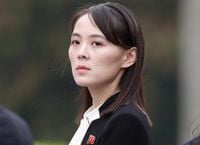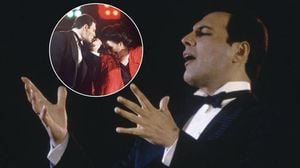North Korea has once again slammed the door on the prospect of diplomatic engagement with South Korea, with Kim Yo-jong, the powerful sister of leader Kim Jong-un, delivering a scathing rebuke of President Lee Jae Myung and the current government in Seoul. Her remarks, widely reported by state media and international outlets on August 20, 2025, come at a time of heightened military tensions and mark a new low in inter-Korean relations.
During a meeting with senior Foreign Ministry officials on August 19, Kim Yo-jong made it clear that Pyongyang sees no value in engaging with Seoul, describing President Lee as a "powerless dreamer" and dismissing South Korea as unworthy of diplomatic consideration. According to the Korean Central News Agency (KCNA), Kim declared, "South Korea is not a country worthy of being our diplomatic counterpart." She further asserted, "Since the Lee Jae Myung administration took office, we can immediately tell they’re making a desperate show of ‘sincere efforts’ to appear as though something has changed in pursuit of ‘improving’ inter-Korean relations. But no matter how they try to wrap up their rotten confrontational instincts with the flowers of peace, a needle always sticks out of the sack."
Kim Yo-jong’s statement, echoed in reports from JoongAng Ilbo and Bloomberg, leaves little doubt about Pyongyang’s current stance. She mocked President Lee’s recent overtures for peace, including his call for restoring a 2018 military agreement aimed at reducing border tensions and his pledge not to pursue unification by absorption. Kim dismissed these gestures as "a delusion and a pipe dream, piece by piece, clause by clause." She sneered, "No matter how firm his determination may be, how is he supposed to carry it out alone? The South Korean people must be quite satisfied just listening to these grand declarations, filled with unachievable dreams."
President Lee, who took office in June 2025, has made several moves to signal a shift from his conservative predecessor’s hardline policies. He has removed front-line loudspeakers that broadcast anti-North Korean propaganda and K-pop, and in a nationally televised speech, he emphasized respect for North Korea’s system, stating that Seoul "will not pursue any form of unification by absorption and has no intention of engaging in hostile acts." Lee also stressed South Korea’s commitment to the international effort to denuclearize the North and urged Pyongyang to resume dialogue with both Seoul and Washington.
Yet, Kim Yo-jong’s response was unambiguous. She accused both conservative and liberal South Korean administrations of harboring unchanged confrontational ambitions toward the North. "We have witnessed and experienced firsthand the filthy political system of South Korea for decades, from the Moon Jae-in administration to the Yoon Suk Yeol administration," she said, adding, "The conclusion is this: Regardless of whether the administration flies the banner of ‘conservatism’ or dons the cap of ‘liberalism,’ their confrontational ambitions against our republic have been handed down unchanged. Lee Jae Myung is not the kind of figure who can reverse the course of history."
Kim Yo-jong also took aim at South Korea’s top security officials, recalling statements by Foreign Minister Cho Hyun and Defense Minister Ahn Gyu-back that they consider the North Korean regime and military to be their enemy. She argued that such positions only reinforce Pyongyang’s distrust and animosity toward the South.
The timing of Kim’s comments is no coincidence. They came as South Korea and the United States kicked off the annual Ulchi Freedom Shield (UFS) joint military exercise, which began on August 18. The drills, involving some 21,000 troops—including 18,000 South Koreans—feature computer-simulated command post operations and field training designed to test and improve readiness against potential North Korean aggression. While Seoul and Washington insist the exercises are purely defensive, Pyongyang has long denounced them as provocative rehearsals for invasion.
Kim Yo-jong echoed this familiar refrain, labeling the UFS drills as "reckless" and a "rehearsal for invasion." She specifically called out the joint wartime operations plan, Oplan 5022, which reportedly includes preemptive measures to neutralize North Korea’s nuclear and missile capabilities and expand strikes into North Korean territory. "While pretending to extend a hand for reconciliation, they are reviewing a plan to remove our nuclear and missile capabilities early and extend their offensive into our territory," she charged, arguing that such actions reveal the "duplicitous character of the South Korean authorities."
North Korea’s leader, Kim Jong-un, has also weighed in, describing the US-South Korea exercises as an "obvious expression of their will to provoke war," according to KCNA. In response, Kim Jong-un has promised a rapid expansion of North Korea’s nuclear forces, recently inspecting the regime’s most advanced warship being fitted with nuclear-capable systems. Last year, he declared the abandonment of long-held goals for peaceful unification with the South, rewriting the country’s constitution to mark Seoul as a permanent enemy.
Against this backdrop, Pyongyang’s rejection of dialogue appears even more entrenched. Kim Yo-jong stated flatly, "South Korea will not even be given the role of a background extra in the regional diplomatic theater centered around our state." She instructed the North’s Foreign Ministry to develop a "strategic response" to hostile states and their sympathizers, based on the regime’s assessment of the South’s "true nature." As reported by Bloomberg, she warned of "countermeasures" against what she called "the most hostile state" and signaled that any future diplomatic efforts would exclude Seoul entirely.
The North’s hardening position comes as its diplomatic priorities have shifted markedly in recent years. Since Russia’s full-scale invasion of Ukraine, Kim Jong-un has placed Moscow at the center of his foreign policy, sending troops and weapons to support President Vladimir Putin’s war and using the conflict as cover to accelerate North Korea’s military nuclear program. Meanwhile, negotiations with Washington and Seoul over denuclearization have remained stalled since the collapse of talks with then-US President Donald Trump in 2019.
For South Korea, the implications are sobering. Lee Jae Myung’s administration has sought to restore some measure of dialogue and stability on the peninsula, but Pyongyang’s latest statements suggest that any hopes for a thaw are, at least for now, misplaced. Kim Yo-jong’s biting rhetoric and Pyongyang’s ongoing military buildup make clear that the North has little interest in engagement—unless, perhaps, the terms are entirely on its own terms.
As the Ulchi Freedom Shield exercises continue and both sides trade accusations, the Korean Peninsula faces yet another period of uncertainty and tension. Whether diplomatic channels can be revived remains to be seen, but for now, North Korea’s message is unmistakable: Seoul is out in the cold.






